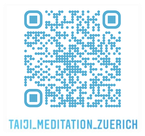
Tai Ji ist eine Kunst, in der das Weiche das Harte überwindet. Durch das Taiji-Training können wir Harmonie mit uns selbst entwickeln und den Menschen und Energien in unserer Umgebung.
Im Üben der Taiji-Form entwickeln wir innere Stärke. Mit den Partnerübungen (Pushing hands, Tuishou) üben wir die Anwendung des Taiji und entwickeln unsere Sensibilität. Hier geht es nicht um
Kraft oder Muskelstärke, sondern darum, sich völlig zu entspannen und die Intention des Partners aufzunehmen und der inneren oder äusseren Kraft nachzugeben. Der ganze Körper ist so leicht, dass
eine Fliege nicht landen könnte, ohne ihn in Bewegung zu setzen.
Dies ist keine Schwäche. Die Füße sind mit dem Boden verwurzelt und die zentrale Stabilität im Körper ist fliessend. Äußerlich entspannt und innerlich stark zu sein, ermöglicht es uns, den
äusseren Druck des Partners ohne Gegendruck zurückzuschicken. Ein Fähigkeit, von der wir auch in unserem Alltag profitieren.
.
Tai Ji is an art in which the soft overcomes the hard. Through Taiji training we can develop harmony with ourselves and the people and energies around us.
In practicing the Taiji form we develop inner strength. With the partner exercises (Pushing hands, Tuishou) we practice the application of Taiji and develop our sensitivity. Here it is not about
strength or muscular power, but about relaxing completely and absorbing the partner's intention and yielding to the inner or outer power. The whole body is so light that a fly could not land
without setting it in motion.
This is not a weakness. The feet are rooted to the ground and the central stability in the body is fluid. Being outwardly relaxed and inwardly strong allows us to return the partner's external
pressure without counterpressure. An ability that we also benefit from in our everyday lives.
.
Based on Patrick Kelly: Relax, Deep Mind, p. 8 and the "Green book"
Foto: Reading in "Infinite Dao" on a boat trip on the Zürich lake

